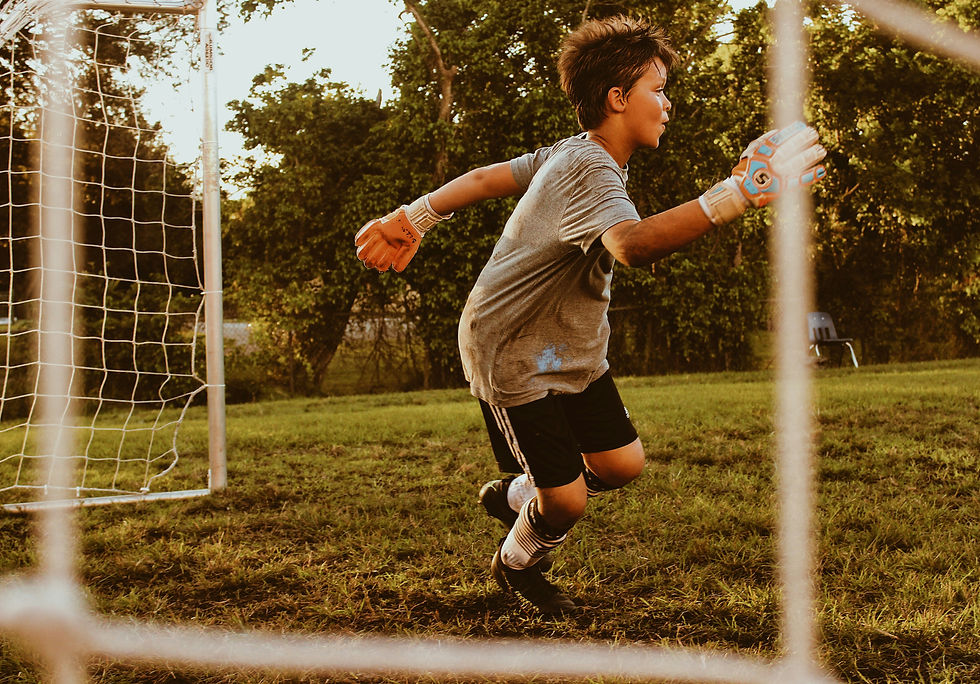How Can Parents Ensure Their Child's Safety in Sports?
- Elevated Magazines
.jpg/v1/fill/w_320,h_320/file.jpg)
- Jun 3, 2024
- 3 min read
Ensuring a child's safety in sports is a paramount concern for parents. Participation in sports offers numerous benefits, including physical fitness, teamwork, and discipline. However, it also comes with risks of injuries and other safety concerns. By taking proactive measures, parents can create a safer environment for their children to enjoy and thrive in sports. This guide will provide valuable tips and strategies for parents to help safeguard their young athletes against potential hazards.

Proper Gear and Equipment
Equipping children with the right gear is crucial in preventing injuries. Parents should ensure that all sports equipment, from helmets to shoes, fits properly and is suitable for the sport their child is playing. Properly fitted gear not only enhances performance but also offers essential protection against common injuries.
Parents should regularly inspect and maintain this equipment to ensure it remains in good condition. Worn-out or damaged gear can be ineffective and might even pose new risks. Investing time in understanding the necessary equipment and its upkeep can significantly contribute to a child’s safety on the field. From prescription sports glasses to proper padding, parents should be familiar with the required equipment and how to maintain it. Meticulous attention to detail in this aspect can go a long way in preventing accidents.
Understanding the Rules and Techniques
Knowing the rules of the game and practicing the correct techniques can greatly reduce the risk of injuries. Parents should encourage their children to learn and adhere to the rules of their sport. Proper understanding of the game helps children avoid unnecessary accidents and ensures fair play.
Learning and practicing the right techniques, whether it's for tackling in football or landing a jump in gymnastics, is essential. Coaches play a vital role here, but parents should also reinforce these lessons and ensure their children are not only playing to win but also playing safely.
Regular Medical Check-ups
Routine medical check-ups are vital for monitoring a child's health and fitness levels. Pre-season physical exams can identify any underlying health issues that could be exacerbated by intense physical activities. These check-ups ensure that children are fit to participate in sports and provide a medical baseline for future comparisons.
Parents should also stay vigilant about any signs of fatigue or stress in their child. Regular check-ups throughout the season can help catch early signs of overuse injuries or other health concerns, allowing for timely intervention and treatment.
Hydration and Nutrition
Maintaining proper hydration and nutrition is essential for young athletes. Parents should make sure their children drink plenty of water before, during, and after games or practice sessions. Dehydration can lead to serious health risks like heat exhaustion or heat stroke, particularly in high-intensity sports.
A balanced diet rich in essential nutrients supports overall health and athletic performance. Parents should provide meals that include a mix of proteins, carbohydrates, and healthy fats, ensuring their children have the energy they need for both sports and academics. Consulting with a nutritionist can offer tailored advice for individual needs.
Open Communication and Support
Encouraging open communication between parents, children, and coaches can significantly enhance safety. Children should feel comfortable discussing any pain or discomfort they experience. Open dialogue allows for immediate attention to potential injuries and helps prevent them from becoming more serious.
Parental support extends beyond just physical aspects. Emotional and psychological well-being is equally important. Encouragement, understanding, and positive reinforcement help children enjoy sports more fully and build the resilience needed to face challenges both on and off the field. Ongoing support from parents can create a safe and nurturing environment for children to thrive in sports.
Monitoring Mental Health and Well-being
Participation in sports can also impact a child's mental health and well-being. Parents should monitor their children for any signs of stress, anxiety, or other mental health concerns that may arise from sports. Encouraging a healthy balance between sports and other activities, as well as offering emotional support, can help prevent burnout and promote overall well-being.
Parents should also be aware of the potential for bullying or other negative behaviors within sports teams. Creating a safe and inclusive environment is crucial for children to feel comfortable participating in sports. It's essential for parents to be actively involved and address any concerns that arise.

Parents play an essential role in ensuring the safety of their children in sports. By understanding the necessary gear and equipment, promoting proper techniques, prioritizing regular medical check-ups, supporting hydration and nutrition, facilitating open communication, and monitoring mental health, parents can create a safer environment for their young athletes to thrive in. With these measures in place, children can fully enjoy the benefits of participating in sports while staying safe and healthy. It is important for parents to actively participate in their child's sporting journey to ensure their safety and well-being.


